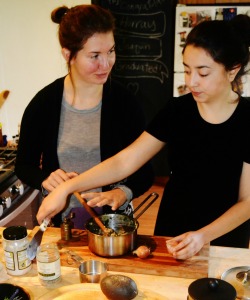
Azul Tellez and Emily MacGibeney are the Office of Sustainability’s Sprout Garden Fellows. Emily also served as a Waste Minimization Fellow in the office before going abroad for the Fall 2014 semester. They led a sustainable food initiative in Portland, Oregon this summer. Azul tells about their experience:
Emily and I spent the summer “Dishing Up Portland.” With funding from Davis 100 Projects for Peace, we made fresh and local produce more available in East and Northeast Portland, Oregon. Our project involved cooking with the produce of small Portland farms, serving the food at community events, and leading free weekly cooking classes. We also handed out educational materials such as recipe cards and encouraged people to go on our website to learn more about organic food.
Emily and I became interested in food deserts, geographic areas where affordable and nutritious food is difficult to access, through courses we’ve taken at Conn and as garden managers for Sprout. We have found that working with fresh, local and organic produce is crucially important for our health, our creativity, and taking care of the environment. The unequal distribution of such produce is extremely unjust; all people should be able to make their own, informed decisions about the quality of the food they eat and have access to it.
Based on our educational and personal backgrounds, a major question preoccupied us: what can we do to increase consumption of healthy foods, particularly fresh and local produce, in food desert areas? “Dishing Up Portland” gave us the opportunity to test how effective a project like ours can be and to gauge East Portland’s interest in and perceptions of cooking with local produce and other healthy foods.
Although Portland is known for its foodie culture and stellar restaurants, not all Portland neighborhoods are equal in that respect. Although big company stores such as Fred Meyers and Bargain Grocery Stores exist in East Portland, their organic brands are overpriced compared to the non-organic brands of food. They also have a meager selection of organic — let alone local — produce, making pre-packaged meals and low quality produce the main options for East Portlanders. Unfortunately, it simply doesn’t make economic sense for customers to buy the $6 bag of organic wild rice over the $1.25 box of mac and cheese. Lastly, while East Portland does have a number of farmers’ markets, people of lower classes often don’t find shopping at farmers’ markets worthwhile.
This is where we stepped in. We wanted to show East Portlanders that shopping at the farmers' markets and cooking with the produce that they buy there is worthwhile, from an economic, sustainability, and culinary perspective. The goal of Dishing Up Portland was to make cooking with local produce and other healthy ingredients such as whole grains and legumes feasible and not daunting. Over the course of the summer, we crafted six different meals that featured seasonal and local produce and whose costs prove that buying organic, fresh, and bulk ingredients is equally or less expensive than buying pre-made meals or conventional produce. We distributed this information at our class, our food cart, and our website, which provides readers with information to make navigating the eating-local and cooking-fresh process easier for people who have had little experience doing it before or who have never been pushed to take interest in it.
Overall, and thankfully, this general aim of our project was clear and successful. While our project was a hit among people who have a sense of the importance of sustainability and the fun of cooking, we were simply not equipped with enough time or experience to make our project reach people who do not. We hope that a local community organization will continue our efforts by using and growing our website as an educational resource.
It was a great summer. Check out our website www.dishingupportland.wordpress.com for more information about our project!